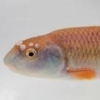Any body seen this with natives? I have seen with phantom Tetris, bluegill, and chickens. Looking for a smaller species where both sexes and juveniles do it outside of breeding season.
Territoriality Not Associated Directly with Reproduction
Started by
Guest_centrarchid_*
, Mar 16 2014 10:09 AM
10 replies to this topic
#1
 Guest_centrarchid_*
Guest_centrarchid_*
Posted 16 March 2014 - 10:09 AM
#2
 Guest_gerald_*
Guest_gerald_*
Posted 16 March 2014 - 04:23 PM
Gambusia!
#3
 Guest_centrarchid_*
Guest_centrarchid_*
Posted 16 March 2014 - 04:58 PM
I save seen pecking order in G. affinis but not territorial.
#4
 Guest_gerald_*
Guest_gerald_*
Posted 18 March 2014 - 10:25 AM
Yellowhead jawfish? Carolina madtoms? terrestrial salamanders? Maybe I'm not clear on the distinction bewteen "pecking order" and "territorial" in the context of an aquarium or small pond (or chicken coop), where space is limited and individuals can never get very far away from each other. Guarding a territory outside of breeding season may still be relevant to breeding, if it's easier to hold a territory year-round than to conquer a new one at the start of breeding season.
#5
 Guest_centrarchid_*
Guest_centrarchid_*
Posted 18 March 2014 - 12:00 PM
I am making distinction between territoriality and pecking order where latter involves exclusion of others from a given physical location while pecking order is the social ranking within a given area /volume. Most organisms seem capable of both. Bluegill typically have a home range with a pecking order operating but where males can slip into territorial mode for breeding. Additionally, some juvenile bluegill will adopt a particular color pattern and exclude all other sunfish from a prime feeding site. Chickens in free-range setting (not a coop) can also form social groups where a pecking order operates within group and where the group works cooperatively to exclude non-members and other groups from a given location. The chicken-type of arrangement is played out in some of the rift lake cichlids of Africa. The other version I am seeing in the tetras is where all individuals, even juveniles, have discrete territories where individuals exclude all others. Breeding occurs when females abandon territories each day to briefly penetrate male territories for spawning. Male and female territories are not always adjacent. I think I know why the tetras are doing their bit.
#6
 Guest_centrarchid_*
Guest_centrarchid_*
Posted 23 March 2014 - 09:12 AM
My thought was that some darters may defend feeding territories outside of breeding season since many keep at least some color year round. Darters around here do not seem to do so but some in the southeastern U.S.A living in more stable / saturated habits might be doing such. Especially the larger species.
#7

Posted 23 March 2014 - 11:45 AM
I have seen that with darters in a captive situation... the learn to know when the food is coming and will "stake a claim". I mean sunfish will "puppy dog" at the front glass, and minnows even will crowd the surface in anticipation (although they just swam and school and there is certainly no way to discern any territory). But I have see the darters wait where they know the flow goes and push away others that try to take the best hydrodynamically-beneficial spot.
Either write something worth reading or do something worth writing. - Benjamin Franklin
#8
 Guest_centrarchid_*
Guest_centrarchid_*
Posted 23 March 2014 - 12:15 PM
Have you seen such in a natural setting? That is where I noticed it first with bluegill. With the bluegill, what promotes them to switch strategies is of particular interest. Why be territorial one minute and not the next?
#9

Posted 23 March 2014 - 12:51 PM
no, I don't get out enough to say I have seen it in the wild... I'm guilty of snorkeling in the nice weather and watching the colorful fish...
Either write something worth reading or do something worth writing. - Benjamin Franklin
#10
 Guest_centrarchid_*
Guest_centrarchid_*
Posted 23 March 2014 - 01:13 PM
That is how I saw it first, snorkeling. It was right in front of me for quite a while before the behavior caught my eye. The first thing noted was a given individual appeared to stay in a very tight area as was very active and easy to see feeding.
#11

Posted 23 March 2014 - 01:16 PM
I'll keep an eye out... I plan to spend a reasonable amount of time at the convention this year face down in the (hopefully) clear water... maybe even with a camera.
Either write something worth reading or do something worth writing. - Benjamin Franklin
1 user(s) are reading this topic
0 members, 1 guests, 0 anonymous users









